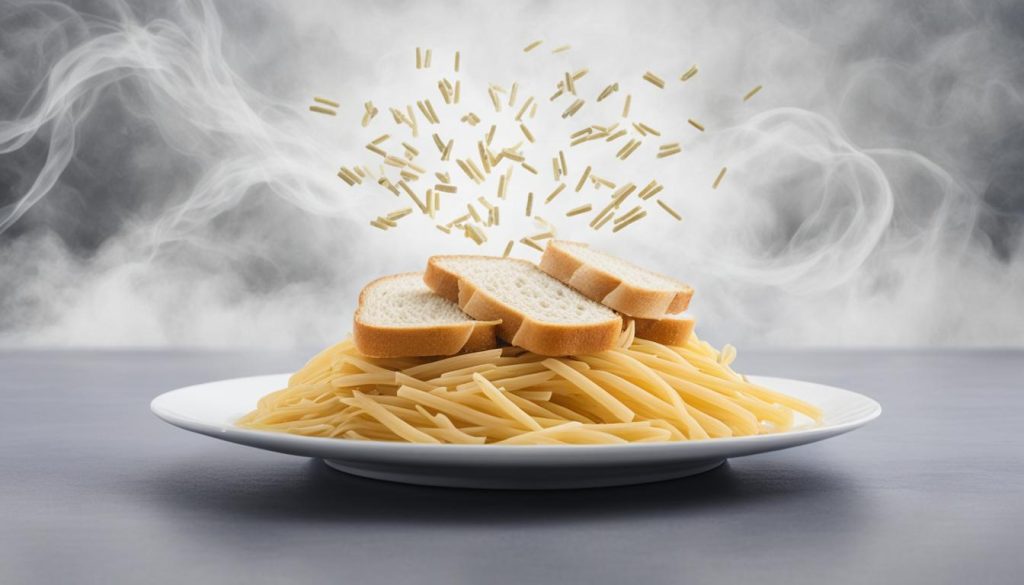Hello, I’m here to share some valuable information about the foods that can harm your memory and cognitive function. It’s important to be aware of these foods and make healthier choices to support optimal brain health. Poor diet and memory loss often go hand in hand, so let’s dive into the details and find out what to avoid.
Consuming unhealthy foods, alcohol, and fish with mercury can negatively affect cognitive function and memory. Foods high in trans fats, highly processed foods, excess alcohol, sugary drinks, refined carbs, and certain dairy products are all examples of memory-damaging foods. By eliminating these foods from your diet and opting for a nutritionally rich, whole-food approach, you can take a proactive step towards enhancing your memory.
Beware of Foods That Are Detrimental to Your Memory
- Avoid sugary drinks, refined carbs, highly processed foods, excess alcohol, foods high in trans fats, and fish with high mercury levels to protect your memory.
- Opt for a diet rich in whole, fresh foods like fruits, vegetables, lean proteins, and healthy fats to support brain health.
- Poor diet and memory loss are linked, so make mindful choices for better cognitive function.
- Eliminating memory-damaging foods is a proactive step towards maintaining a sharp memory.
- Take care of your brain health by nourishing it with the right foods.
Sugary Drinks: A Sweet Treat that Harms Your Memory
Sugary drinks, such as soda, sports drinks, energy drinks, and fruit juice, can have a negative impact on memory. These beverages fall into the category of memory-harming foods due to their high sugar content. In particular, they often contain high-fructose corn syrup, a sweetener that has been linked to various health issues.
Research has shown that consuming sugary drinks can contribute to obesity, diabetes, and even an increased risk of dementia. Animal studies have further revealed that a high intake of fructose, the main component of high-fructose corn syrup, can lead to insulin resistance in the brain.

This insulin resistance not only affects overall brain health but also impairs memory function. In addition, the consumption of sugary drinks has been associated with brain inflammation, further contributing to impaired memory.
If you’re looking to protect your memory and brain health, it’s best to steer clear of sugary drinks and opt for healthier alternatives. Consider hydrating with water, unsweetened iced tea, vegetable juice, or unsweetened dairy products instead. These options provide necessary hydration without the negative effects associated with sugary beverages.
Refined Carbs: Not So Sweet for Your Memory
When it comes to memory health, refined carbohydrates are not your best friend. These carbs, found in sugar and processed grains, can have a negative impact on your memory function.
One of the reasons why refined carbs are detrimental to memory is their high glycemic index and glycemic load. These factors cause a rapid spike in blood sugar levels and insulin release, which can disrupt the delicate balance in your brain.
Research has shown that a high intake of refined carbs can impair memory and increase the risk of Alzheimer’s disease. Additionally, these carbs can lead to inflammation in the brain, further contributing to memory impairments.
It’s important to opt for low-glycemic index (low-GI) carbs to support your brain health. These include vegetables, fruits, legumes, and whole grains, which provide a steady release of glucose into your bloodstream and help maintain stable blood sugar levels. By choosing these healthier carbohydrate options, you can reduce the negative impact on your memory and promote overall brain function.

The Risks of High-Glycemic Refined Carbs:
- Impaired memory function
- Increased risk of Alzheimer’s disease
- Inflammation in the brain
By incorporating low-GI carbs into your diet, you can help protect your memory and maintain optimal brain health. Remember to prioritize fresh vegetables, fruits, legumes, and whole grains in your meals to support your memory function and overall well-being.
Foods High in Trans Fats: Bad News for Your Memory
Foods high in trans fats, such as processed meats, hydrogenated vegetable oils, and packaged snacks, can have detrimental effects on memory. Trans fats have been linked to an increased risk of dementia, memory impairments, and lower brain volume.
Trans fats are artificially created fats that are commonly found in processed foods. They are created by adding hydrogen to liquid vegetable oils to make them solid at room temperature, increasing their shelf life and stability. However, these artificial fats can wreak havoc on our memory and overall brain health.
When consumed in high amounts, trans fats can cause artery damage and inflammation, which can negatively impact brain health. This inflammation can lead to memory impairments and other cognitive difficulties.
Studies have shown that a diet high in trans fats can significantly increase the risk of memory impairment and cognitive decline. In addition, trans fats have been found to lower brain volume, further contributing to memory problems.
To support optimal memory function, it is important to avoid foods high in trans fats and instead opt for natural proteins, healthy fats, and whole foods. Choose lean proteins like chicken, turkey, and tofu, which provide essential nutrients without the harmful effects of trans fats.
Healthy fats, such as those found in avocados, nuts, and olive oil, are crucial for brain health and can help protect against memory impairment. Incorporate these foods into your diet to provide your brain with the nutrients it needs to function at its best.
Lastly, focusing on a diet rich in whole foods, such as fruits, vegetables, and whole grains, can provide essential vitamins, minerals, and antioxidants that support brain health and memory function.
By making mindful food choices and avoiding trans fats, you can safeguard your memory and promote a healthy brain for years to come.
Highly Processed Foods: A Recipe for Memory Trouble
When it comes to maintaining a sharp memory, the food choices we make play a crucial role. Unfortunately, highly processed foods can be a major culprit behind memory decline. These convenient and often irresistible options, such as chips, sweets, instant noodles, microwave popcorn, and ready-made meals, may seem tempting in the moment but can have long-term consequences for our cognitive function.
One of the main reasons why highly processed foods are detrimental to our memory is their low nutrient content. These foods are typically high in calories, but they lack the essential vitamins, minerals, and antioxidants that support brain health. Instead, they are loaded with added sugars, unhealthy fats, and excessive salt, all of which can contribute to inflammation in the body and the brain.
Studies have shown that a diet high in unhealthy ingredients found in processed foods can lead to lower levels of sugar metabolism in the brain. This means that the brain may struggle to utilize glucose, its primary source of energy, effectively. Over time, this can result in decreased brain tissue and function, ultimately leading to memory decline.
Furthermore, the inflammation caused by the consumption of highly processed foods can have detrimental effects on brain health. Chronic inflammation has been linked to various cognitive impairments, including a decline in learning and memory abilities. The brain relies on a balanced and nourishing diet to thrive, and highly processed foods simply don’t provide the necessary nutrients for optimal cognitive function.
Choose Fresh, Whole Foods for Optimal Brain Health
To support your brain health and preserve your memory, it’s important to opt for fresh, whole foods instead of highly processed options. Fresh fruits, vegetables, lean proteins, whole grains, and healthy fats are all excellent choices that can provide the nutrients your brain needs to function at its best. These foods are rich in antioxidants, vitamins, and minerals that promote cognitive function and protect against inflammation.
Incorporating brain-boosting foods into your diet doesn’t have to be complicated or boring. Try adding blueberries, avocados, leafy greens, nuts, and seeds to your meals and snacks. These nutrient-dense foods are not only beneficial for your brain but also delicious and satisfying.
Remember, what you eat can have a significant impact on your memory and overall brain health. By making mindful choices and prioritizing fresh, whole foods, you can give your brain the support it needs to function optimally and maintain a sharp memory for years to come.
Conclusion
It is evident that our food choices play a crucial role in our brain health and memory function. By avoiding certain foods and adopting a healthy eating approach, we can protect and enhance our cognitive abilities.
Sugary drinks, refined carbs, foods high in trans fats, highly processed foods, excess alcohol, and fish with high mercury levels have all been found to be detrimental to memory and cognitive function. These foods can lead to inflammation, impaired memory, and increased risk of dementia.
To support optimal brain health and memory function, it is recommended to focus on consuming memory-boosting foods. Incorporate whole, fresh foods such as fruits, vegetables, lean proteins, and healthy fats into your diet. These foods provide essential nutrients and antioxidants that promote brain health and memory.
By making mindful dietary choices and embracing a healthy eating lifestyle, we can take control of our brain health. Remember, every bite counts when it comes to nourishing our minds and preserving our memory function.
FAQ
What are some foods that are detrimental to your memory?
Foods that can impair memory include sugary drinks, refined carbs, foods high in trans fats, highly processed foods, excess alcohol, and fish with high mercury levels.
How do sugary drinks affect memory?
Sugary drinks, such as soda, sports drinks, energy drinks, and fruit juice, can negatively impact memory. They are high in sugar, particularly high-fructose corn syrup, which has been linked to obesity, diabetes, and an increased risk of dementia.
Why are refined carbs harmful to memory?
Refined carbohydrates, such as sugar and processed grains, can negatively impact memory. These carbs have a high glycemic index and glycemic load, causing a rapid spike in blood sugar levels and insulin. Studies have shown that a high intake of refined carbs can impair memory, increase the risk of Alzheimer’s disease, and cause inflammation in the brain.
How do foods high in trans fats affect memory?
Foods high in trans fats, such as processed meats, hydrogenated vegetable oils, and packaged snacks, can have detrimental effects on memory. Trans fats have been linked to an increased risk of dementia, memory impairments, and lower brain volume. They can also cause artery damage and inflammation, which can negatively impact brain health.
What are the effects of highly processed foods on memory?
Highly processed foods, including chips, sweets, instant noodles, microwave popcorn, and ready-made meals, can contribute to memory decline. These foods are often high in calories, low in nutrients, and packed with added sugars, fats, and salt. Studies have shown that a diet high in unhealthy ingredients found in processed foods can lead to lower levels of sugar metabolism in the brain, decreased brain tissue, inflammation, and a decline in learning and memory.




